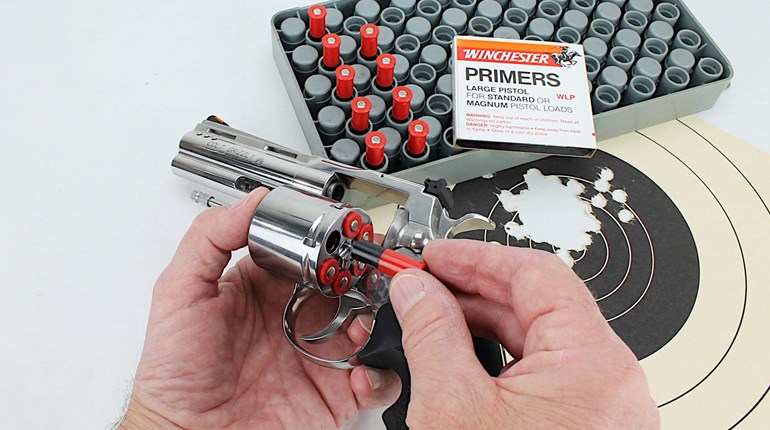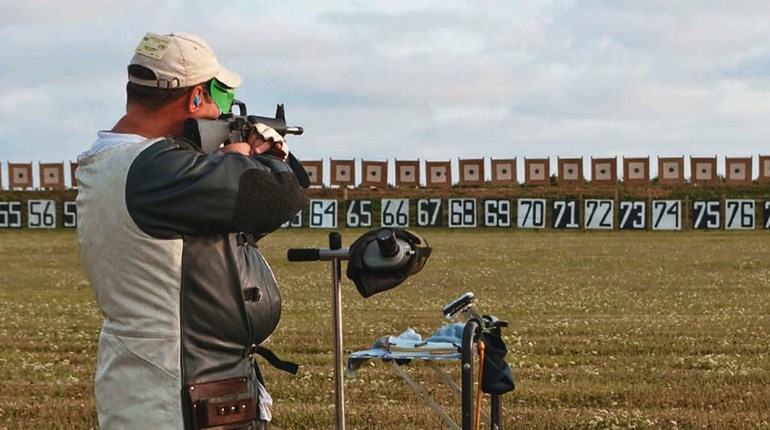When Savage Arms' Megan Harten handed me the brand-new (and, at the time, still unreleased) Renegauge 12-gauge shotgun that I would be using to shoot five-stand sporting clays the following day, I was already trying to fend off the dread that surrounds every occasion in which I've been asked to shoot a scattergun. When I reluctantly handed it back to her a couple of joyous hours later, that dread had been replaced by my New Year's resolution: to see a Renegauge in my gun safe before 2020 is out.
A few words about "that dread" are in order. As an editor employed by the NRA, it's embarrassing to admit that, up until now, shotguns have brought me nothing but pain. Part of the problem is fit--I'm right on the bubble between needing a compact gun and a full-size. Part of the problem is that, like many women, the proportions of my neck, shoulder and cheekbones make it tough for me to get a good stock-to-body weld. Without a good stock-to-body weld, I experience a shotgun's recoil as a punch to the face and shoulder. Because it hurts, the flinch becomes uncontrollable for me and I can't even see the clay birds, let alone hit them.
The Renegauge is different. Very different. My honest estimation of this 12-gauge shotgun's felt recoil is that it's about what I would expect from a semi-automatic rifle chambered in .223 when we loaded the Renegauge with light target loads. When we loaded it with flaming-hot waterfowl and turkey loads, the perceived recoil did indeed increase...to about what I'd expect from a bolt-action .243. Yes, that's a very bold claim, but behind that claim is years of research and engineering resulting in a truly innovative shotgun.
Although Savage is most famous for their devastatingly accurate bolt-action rifles, the company does have a history of shotgun engineering to draw from. In recent decades, the majority of those shotguns have been produced under the Stevens imprint, but Savage has also traditionally offered a bolt-action slug gun for big-game hunters who live in shotgun-only areas. But don't let that lead you to believe that the Renegauge is a "line extension" or "new version" of anything Savage (or Stevens) has produced in the past. This remarkable semi-auto was engineered from the ground up with all of the care and patience a truly new idea requires.
It starts with the Renegauge's patented Dual Regulating Inline Valve (D.R.I.V.) system. To put it as simply as possible, two valves beneath the barrel work together to regulate the pressure needed to work the action and eject the spent shell. As Harten explained, "The pressure needed to work the action enters in, but any excess pressure dumps through the front of the gas system. The result is an action that regulates energy with every shot. The D.R.I.V. gas system valves only pull enough energy to cycle the action, regardless of the load." The company advertises that anything from a low-recoiling 2 3/4-inch shell to a 3-inch magnum will cycle reliably through this shotgun, and my field-testing proved that the Renegauge will eat anything you feed it.
Speaking of feeding shells, loading the Renegauge turned out to be another unexpected pleasure. If you've ever had the loading gate of a shotgun snap down on your thumbnail hard enough to turn it black the next day, you'll be as pleased as I was to discover that the Renegauge's feed ramp uses a beveled loading port to make it impossible to trap your thumb.
The Renegauge also offers a truly superior out-of-the-box fitting system that allows you to essentially be your own gunsmith and tailor the shotgun to your particular anatomy. According to Savage, the Renegauge can be set up in no fewer than 20 unique ways, using the Renegauge's interchangeable recoil pads, cheek risers and shims. You're not just adjusting drop at comb and length of pull; you're adjusting drop at toe, drop at Montecarlo, pitch...basically, you can alter just about any part of this shotgun that needs to be in contact with your body. This kind of customizability is useful to all shooters, but it's of particular interest to women. You see, women tend to have proportionally longer necks and higher cheekbones than men do...and those are two critical measurements that make it tough for some women (like yours truly) to find a really great out-of-the-box fit.
But I didn't know any of that, that day, in that Oklahoma sporting-clays field. I thought I would spend the next hour getting beaten up and missing all but the first two birds because I couldn't stop flinching, then the rest of the evening nursing the bruises to my shoulder, face and ego. So when Megan put that shotgun in my hands, I took it with the polite resignation of someone who is about to be thoroughly humiliated. But Megan had made a couple of subtle adjustments. I shouldered the gun. To my surprise it just sort of...molded itself to me, snuggling up into my clavicle and smoothing into my cheek. I called "PULL," and a blaze orange clay appeared against the bright late-autumn sky. I slapped the trigger, already preparing a self-deprecating comment about what a rotten shot I am with a shotgun.
But that clay shattered. As did the one after that, and the one after that, and the one after that. I know hitting 15 out of 25 birds doesn't sound like much to most clay-games shooters, but it's hands-down the best I've ever done...and it's the first time I have ever enjoyed myself on the clays range. The Renegauge took all of the punishment for me, allowing me to focus on my fundamentals (which admittedly still need lots of work) and on the target, instead of anticipating the pain.
Production models of the Renegauge are expected to start shipping in late summer/early fall of this year, and will be available in three basic models, all in 12 gauge. There's a Field Grade model available in a 26- or 28-inch barrel; a Waterfowl model with the same barrel options; and a Turkey model with a 24-inch barrel. The expected MSRPs are $1,449, $1,549 and $1,549 respectively...but owning a shotgun that won't treat me like a rented mule will be priceless.
Explore The NRA Universe Of Websites
- Clubs and Associations
- Competitive Shooting
- Events and Entertainment
-
Firearms Training
- NRA Gun Safety Rules
- Firearm Training
- Become An NRA Instructor
- Become A Training Counselor
- NRA Range Safety Officers
- Shooting Sports Coach Development
- Adaptive Shooting
- NRA Gunsmithing Schools
- NRA Online Training
- NRA Program Materials Center
- NRA Marksmanship Qualification Program
- Find A Course
- NRA CCW
- NRA Training Course Catalog
- Giving
- History
-
Hunting
- Hunter Education
- Youth Hunter Education Challenge
- NRA Whittington Center
- NRA Hunters' Leadership Forum
- Great American Outdoor Show
- Hunters for the Hungry
- American Hunter
- Hunting Legislation Issues
- State Hunting Resources
- NRA Institute for Legislative Action
- American Rifleman
- Adaptive Hunting Database
- Outdoor Adventure Partner of the NRA
- Law Enforcement, Military, Security
- Media and Publications
-
Membership
- Join The NRA
- NRA Member Benefits
- Manage Your Membership
- NRA Store
- NRA Whittington Center
- NRA Endorsed Member Insurance
- NRA Membership Recruiting
- NRA State Associations
- NRA Membership For Women
- NRA Life Membership
- Renew or Upgrade Your Membership
- NRA Junior Membership
- NRA Business Alliance
- NRA Industry Ally Program
- Politics And Legislation
-
Recreational Shooting
- America's Rifle Challenge
- NRA Whittington Center
- Women's Wilderness Escape
- NRA Day
- The NRA Range
- Home Air Gun Program
- Adaptive Shooting
- Range Services
- NRA Member Benefits
- Great American Outdoor Show
- NRA Springfield M1A Match
- Shooting Illustrated
- Firearm Training
- NRA Marksmanship Qualification Program
- NRA Training Course Catalog
- Women On Target® Instructional Shooting Clinics
- Safety and Education
- Scholarships, Awards and Contests
- Shopping
- Volunteering
-
Women's Interests
- NRA Membership For Women
- NRA Women's Network
- Women On Target® Instructional Shooting Clinics
- Refuse To Be A Victim®
- Women's Wilderness Escape
- Women's Programs Endowment
- Jeanne E. Bray Memorial Scholarship
- Marion P. Hammer Women Of Distinction Award
- Sybil Ludington Women's Freedom Award
- Women's Wildlife Management / Conservation Scholarship
- Become An NRA Instructor
-
Youth Interests
- Eddie Eagle Treehouse
- Scholarships, Awards & Contests
- NRA Day
- NRA Marksmanship Qualification Program
- Youth Education Summit
- Adventure Camp
- Youth Hunter Education Challenge
- National Junior Shooting Camps
- Youth Wildlife Art Contest
- Home Air Gun Program
- NRA Junior Membership
- NRA Family
- Eddie Eagle GunSafe® Program
- NRA Gun Safety Rules
- Collegiate Shooting Programs
- National Youth Shooting Sports Cooperative Program
- Request for Eagle Scout Certificate



























